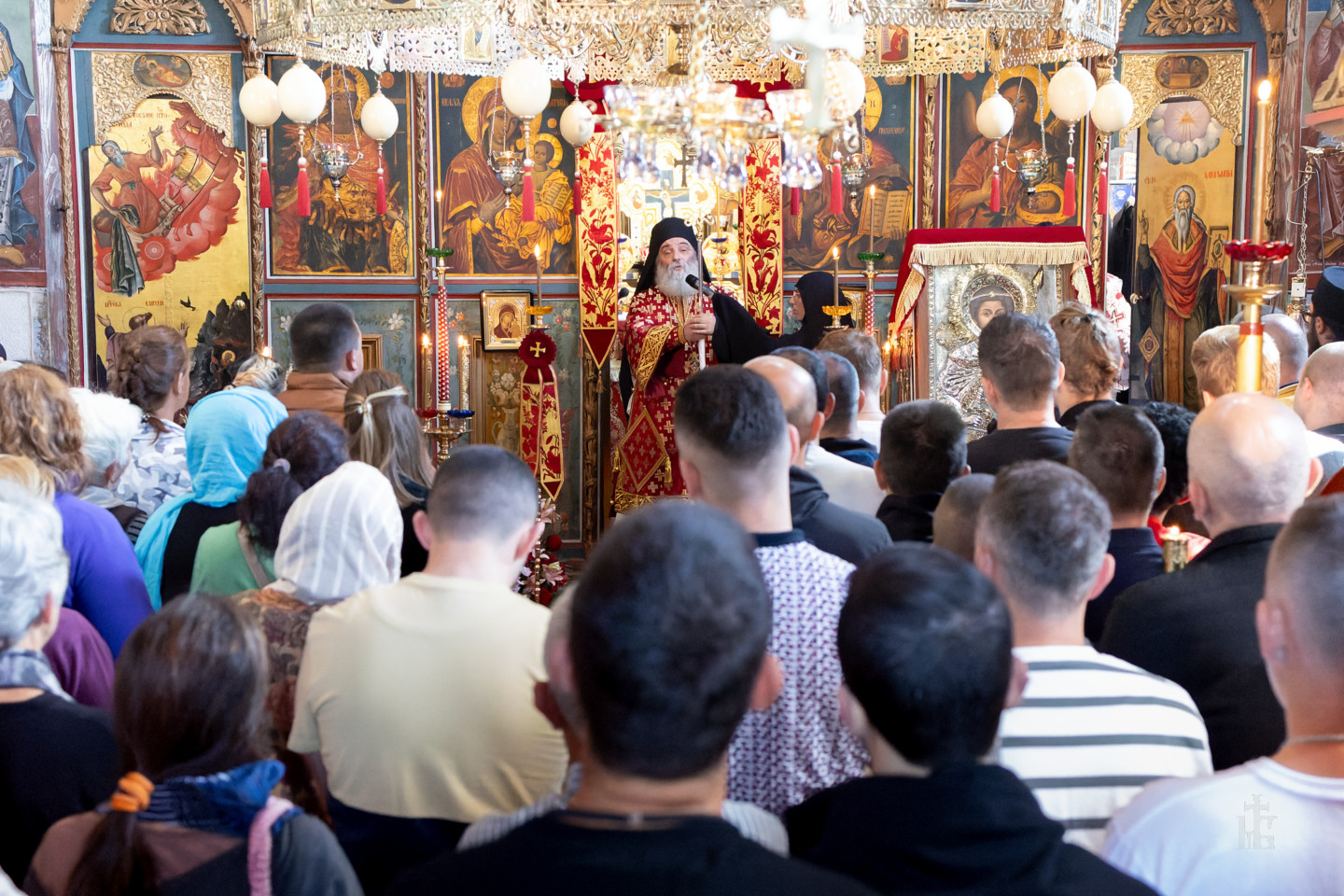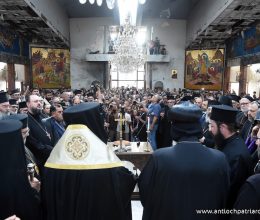A Sermon by His Grace, Bishop Partenij of Antania, Abbot of the Holy Monastery of Bigorski, delivered during the Divine Liturgy on the Feast of the Exaltation of the Precious and Life-Giving Cross in Rajcica, following the reading of the Holy Gospel, on September 14/27, 2024, the Year of our Salvation.
In the Name of the Father, and of the Son, and of the Holy Spirit!
Reverend and honorable fathers,
Brothers and sisters in monastic life,
Respected chanters,
Beloved and blessed brethren in Christ,
We are now immersed in the liturgical celebration of this great and solemn feast – the Exaltation of the Precious and Life-Giving Cross of the Lord. We have experienced, are experiencing, and will continue to experience the revelation of the Cross, of the holy sacrifice that the merciful God offered there, on the dread Golgotha, for the salvation of every human soul.
The Holy Mystery of the Cross, beloved ones, is vast and unfathomable. Through His crucifixion, the Lord stretched out His arms on the Cross and embraced us with His love, showing us that true love must be sacrificial. Only that love which sacrifices itself is genuine love, and it is in this way that Christ demonstrated His true and profound love for us, His children.
Beloved in the Lord, the Cross is not merely a symbol of suffering; rather, it is, above all and in essence, a testimony of God’s boundless love that surpasses all human understanding. This love, revealed through the sacrifice on the Cross, is not just an expression of salvation, but also a call to each of us to receive it and follow it—carrying our own cross with the same faithfulness and devotion.
Thus, He said: If you love Me, keep My commandments (John 14:15). There is, therefore, a sign of recognition: only he who keeps His commandments, who has an essential and active love, can be called His true disciple. To His disciples and apostles, and through them to all of us, the Lord says: By this all will know that you are My disciples, if you have love for one another (John 13:35). Here, the Lord distinguishes the love that is genuine from that which is false, superficial—a love that remains merely in words and without deeds. As He said to the Israelites in the Holy Scripture, rebuking them: Not everyone who says to Me, “Lord, Lord,” shall enter the kingdom of heaven, but he who does the will of My Father in heaven (Matthew 7:21).

Dearest brethren, the Lord, who has loved us with infinite love, calls us to a single path—the path of the Cross, the only path that leads to resurrection, to salvation. He Himself set an example of substantive, sacrificial love, when through His sacrifice, He embraced us and set us free. This love, which is not just a word, but an effective, perfect, redemptive action, guides us toward eternal life.
It remains for us to strive to respond to this call, to become active, sacramental Christians, for the Cross is a great mystery. It is revealed only to those who approach it with faith, humility, and love. Just like in the events following Christ’s Crucifixion: those who truly loved Him, even though temporarily fearful and hidden, were seen by the Lord, and He recognized the love in their hearts. To them—to those who longed for Him—He appeared alive, resurrected—first to the Myrrh-bearing Women, to the Apostle Peter, who had denied Him but sincerely repented, as well as to many others during the forty days, speaking with and comforting them by His presence.
Only if we desire Him with all our soul, through ascetic struggle, through sacrifice for others, through the journey to the Heavenly Kingdom, illuminated and sanctified by the Cross, only then will we be able to penetrate the mystery of the Cross. This mystery, as the Holy Apostle Paul tells us, is a “stumbling block to the Jews”—that is, to those who rely on external signs—and “foolishness to the Greeks”—that is, to those who rely on human logic and wisdom (cf. 1 Cor. 1:23). Here, the “stumbling block” indicates that the manner of salvation chosen by God surpasses human expectations and requires complete humility to comprehend the Divine Economy. Allegorically, the Cross represents a turning point, where human expectations of glory, power, and wisdom are overturned. God’s wisdom, embodied in Christ’s sacrifice, surpasses human logic and philosophy. The Cross symbolizes self-sacrificial love, humility, and sacrifice. It is a “stumbling block” for those who seek external signs (the Jews) and “foolishness” for those who rely on logic (the Greeks). But for those who are called and accept this message, the Cross is the power and wisdom of God (cf. 1 Cor. 1:24).
Is it not the same today? For many, the Cross remains a stumbling block; for many, it is foolishness. Yet, its light and its mystery transcend the boundaries of all societies, epochs, knowledge, and sciences. The Cross of Christ shines ever more brightly, exalted above every pedestal of this world.

Truth-Seeking Scholars of the Past and Present, delving deeply into the essence of God’s creations, perceive the wisdom of the Creator. For whoever sincerely and with a pure heart seeks knowledge and the cause of existence will eventually encounter Him Who is the Source and Treasury of all knowledge and wisdom. Thus, many of the great minds throughout history have bowed before the Crucified and Resurrected humble God—the Nazarene Christ. They do not view the Cross as a stumbling block or as foolishness, but rather as the profoundest wisdom and a sign of God’s love that redeems the world. Through their work, they glorify not only the wisdom of creation but also the life-giving power of the Cross.
The Cross, beloved ones, remains opaque to those who approach it with pride and self-satisfaction. But for those who bow before the mystery of God’s love with humility, it becomes a light and guide to eternal life.
Never forget that the Christian life is the path of the Cross. It is a path of constant trials, afflictions, and hardships. But the Lord Himself forewarned us of this: In the world you will have tribulation (John 16:33). However, He is also the One who said: If anyone desires to come after Me, let him deny himself, take up his cross, and follow Me (Matthew 16:24). This is the path of life, for through the Cross, through death, the Lord has conquered death. Thus, for the one who believes, who is baptized into Christ, there is no death, no fear.
This was first confirmed by His initial followers, the Holy Apostles. All of them, as we know, gave their lives in this world so that they might live in the eternal one. They were fearless before dangers and overcame the world through the strength of their faith and the sacrifice of their love. Following their example, throughout history, countless martyrs shed their blood for Christ the Savior and were deemed worthy of the Heavenly Kingdom. Their names are written in the Book of Life, and their memory remains eternal. We all know and venerate those who took up the Cross of Christ on their shoulders and bore it to the end with humility.
This, indeed, is the essence of the Christian life: to take up our own cross and follow the Lord with humility and patience. And always, in difficult moments, His support is with us. The Lord, who has called us to this path, never leaves us without His grace and strength. Let us strive, beloved, with the same humility and love, to follow Him, carrying our own cross, so that we may be deemed worthy of the eternal life He has promised us.
Observe how significant it is when God says, “Whoever desires, let him come after Me.” With this, He shows us that the cross is not imposed, but is a path that we freely choose, voluntarily. It is a path of gratefully bearing the cross, in freedom and love. Just as the Lord Himself showed us how to love—unto the end, unto death, unto Golgotha, on the Cross. For our neighbor, for our fellow man. This is what we are all called to do. In our time and in our circumstances, it is not necessary to shed our physical blood for Christ, but by bearing and enduring others, loving others, and doing everything for their good, we pour forth spiritual blood.
Is this not what the monks in the monasteries are doing? What else is it if not pouring out spiritual blood? To some, it may seem easy to be a monk, but know that it is not so at all. Monks are also people, with the same nature, with their own temptations, passions, and struggles. Look within yourself: what happens when you are attacked by passions? We all bear these burdens. And the monk, when overwhelmed by the stormy sea of passions, has no choice but to run to prayer and to the safe harbor—Christ God. He must pray, beseech the Deliverer to calm these waves with His grace. To grant him strength to rise above them and all the allurements of this world. And we know, these allurements are not few. Therefore, let us pray for the monks, let us pray for all Christians, for the Lord says: If they persecuted Me, they will also persecute you (John 15:20). And even today, beloved, the persecutions and testimonies of the true followers of Christ do not cease.

Thus, let us arm ourselves with the virtues—faith, hope, and love. He Who was crucified for us will not abandon us. He never forsakes us, but even now suffers alongside us and sends rays of grace from His Cross, so that we may have light in our lives, that we may carry our crosses, overcome this world, and conquer the distorted desires that draw us away from Him. That we may overcome the old man who decays in deceitful lusts and inherit the Heavenly Kingdom.
This requires a strong desire and great dedication, but history proves that it is possible. A man without God, without striving toward the Heavenly Kingdom, cannot be a true man. Now, perhaps more clearly than ever, this is seen in the state of Christian societies on European soil. We see an unrecognizable image of the old Christian Europe, and we all acknowledge that it seems as if there is no bright future for it. There is no birth rate among Christians. Other peoples come and occupy European territory. Why? Because the Europeans have distanced themselves from Christ, who was the foundation of their families, their societies, their civilization, and our civilization. When we abandon God, the future vanishes. We all see this fact: there is no future without God.
But let us not lose hope; rather, let us pray and struggle. Christ assures us that even when Christians are few in number, if they are true, they are like leaven, like salt. A little leaven leavens the whole lump, and a little salt seasons the whole dish. So too, if we labor with love for Christ, with sacrifice, love, and patience, we can contribute to the transformation of our environment.
May God grant us the strength to remain His disciples, children of the Holy Cross, and to continue on the path He has shown us, to walk in the mystery of the Cross, which is the mystery of perfect love.
Amen















